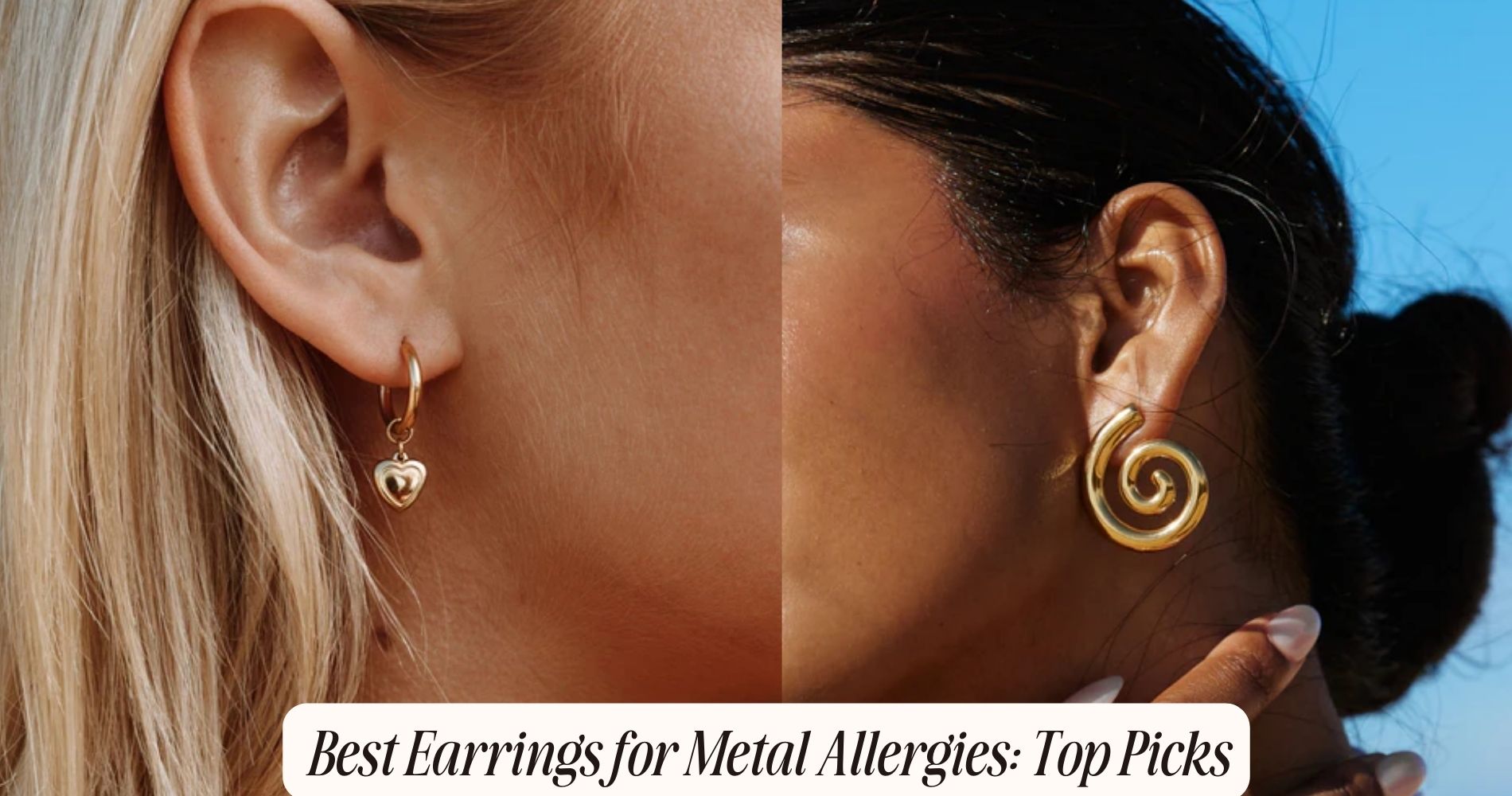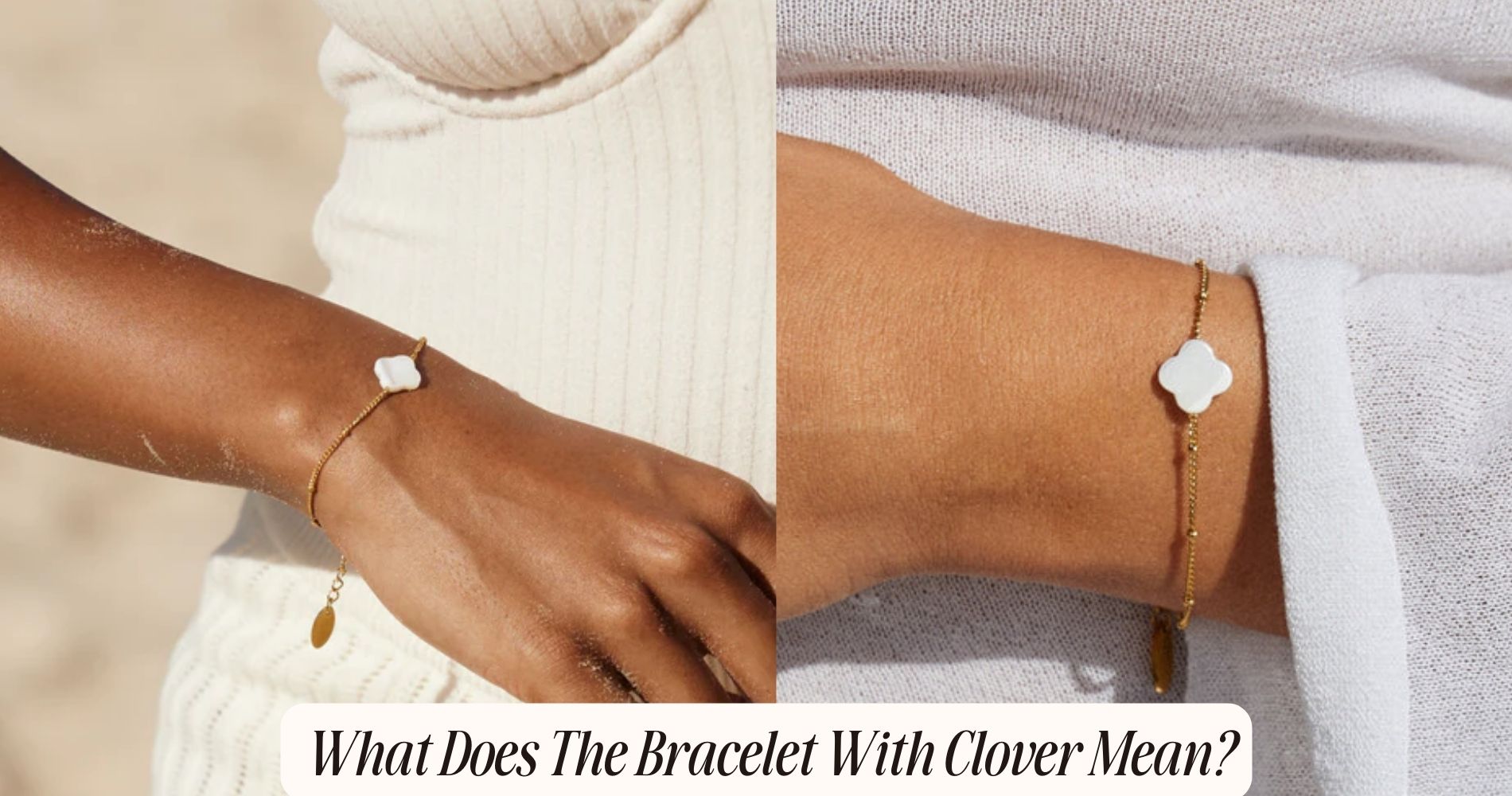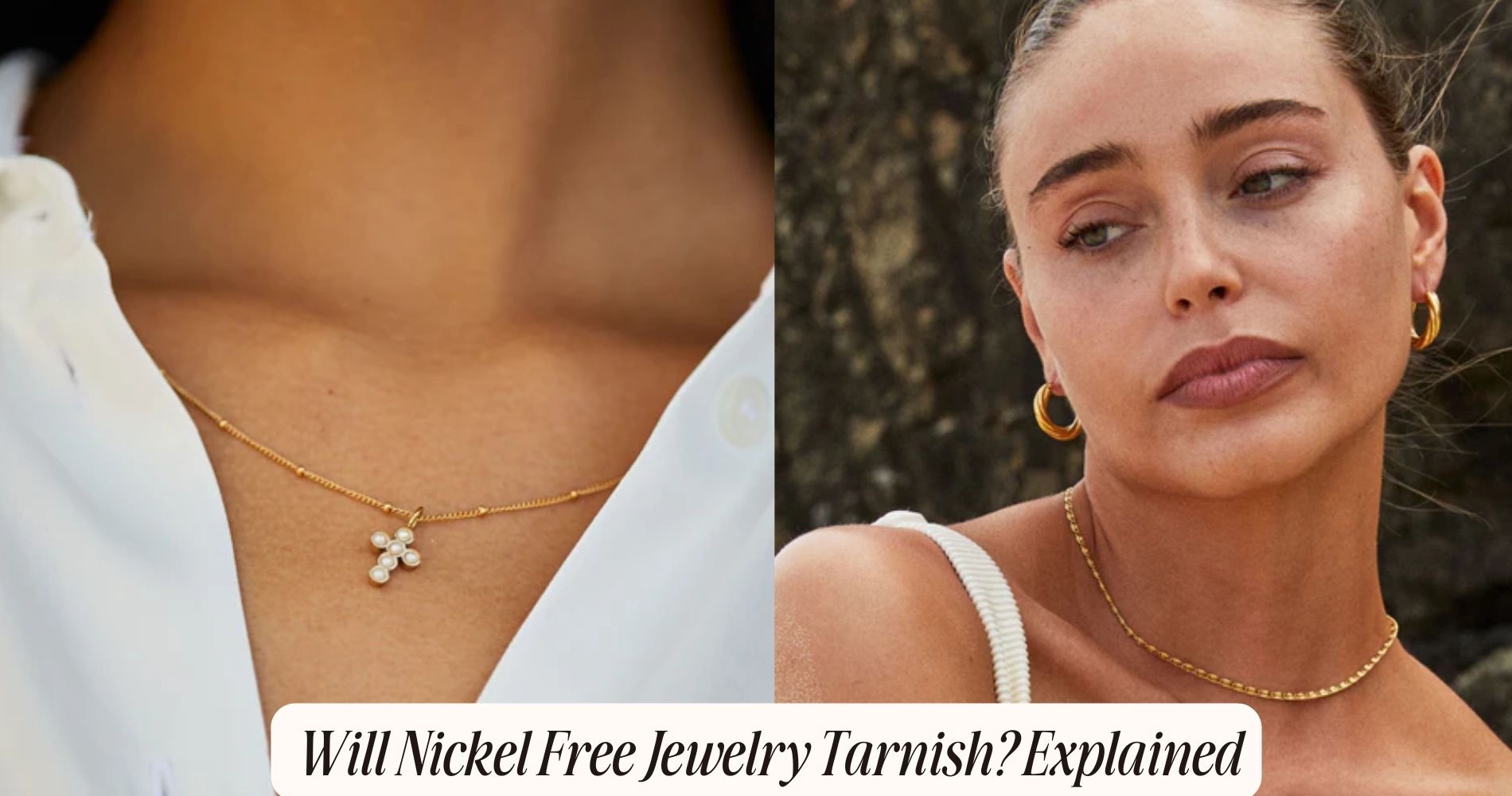
Best Earrings for Metal Allergies: Top Picks
When dealing with metal allergies, choosing the right earrings is crucial. Earrings for metal allergies should be made from hypoallergenic materials like titanium, niobium, and surgical-grade stainless steel to ensure both comfort and style without causing allergic reactions. Titanium is renowned for its strength and durability, while niobium allows for a variety of color options through anodization. Surgical-grade stainless steel, specifically marked as 316L or 316LVM, offers a good balance between biocompatibility and durability. For a more luxurious option, platinum is both upscale and hypoallergenic. Gold enthusiasts should opt for 14k or higher, ensuring it's nickel-free. Additionally, sterling silver earrings marked '925' are a reliable choice for sensitive ears. Explore our Hypoallergenic Hoop Earrings collection to discover more options and gather the necessary details for a purchase that will keep your ears happy and healthy.
Hypoallergenic Materials
When choosing earrings for metal allergies, opting for hypoallergenic materials like titanium, niobium, or surgical-grade stainless steel is crucial to prevent adverse reactions. These metals are less likely to cause irritation and are perfect for sensitive skin. Titanium, for example, is both lightweight and strong, making it a popular choice for those with metal sensitivities. Niobium is another excellent option as it's naturally hypoallergenic and can be anodized to produce various colors without compromising its safety.
In addition to these metals, ceramic earrings provide a stylish and hypoallergenic alternative. Ceramic is inert and non-reactive, ensuring that your ears remain irritation-free. This material can be molded into various shapes and designs, offering both fashion and function.
Moreover, plastic options shouldn't be overlooked. Medical-grade plastic serves as a viable hypoallergenic material that can be used for earrings. It's particularly beneficial for individuals who can't tolerate any metal at all. These plastic earrings are durable and come in a wide range of styles, making them suitable for daily wear or special occasions.
Nickel-Free Options
Selecting nickel-free options is crucial for those with metal allergies to avoid discomfort and potential skin reactions. Nickel sensitivity is one of the most common causes of allergic contact dermatitis, leading to symptoms such as redness, itching, and swelling.
To mitigate these allergy symptoms, you'll want to opt for earrings made from materials that don't contain nickel.
You should consider earrings crafted from surgical-grade stainless steel, which is designed to be hypoallergenic and nickel-free. This material isn't only safe but also durable and resistant to tarnish.
Another excellent choice is sterling silver, provided it's marked as nickel-free. Look for labels like '925' which indicates high-quality silver with minimal potential for causing reactions.
Gold earrings, particularly those that are 14k or higher, are also a reliable choice. Make sure the gold used is pure and not alloyed with nickel. Always check for certifications or guarantees from reputable jewelers that the earrings are nickel-free.
Titanium Earrings
Titanium earrings offer another excellent alternative for those with metal allergies, thanks to their hypoallergenic properties and resistance to corrosion. They're a fantastic option if you have sensitive skin but still want to enjoy stylish accessories. Titanium's biocompatibility guarantees it won't cause irritation or allergic reactions, making it a top choice for those with metal sensitivities.
One of the appealing aspects of titanium earrings is the variety of color variations available. Manufacturers can anodize titanium to produce a spectrum of hues, including natural silver, vibrant blues, rich purples, and even striking greens. This diversity allows you to find the perfect pair that suits your style while ensuring your comfort.
When it comes to the price range, titanium earrings are quite affordable, especially considering their durability and hypoallergenic benefits. You can find quality titanium earrings starting at around $20, with more intricate designs and higher-end brands costing upwards of $100. This makes them accessible for various budgets, guaranteeing you don't have to compromise on safety or style.
Surgical Steel Choices
When choosing earrings for metal allergies, consider surgical steel for its hypoallergenic properties, which greatly reduce the risk of irritation.
You'll appreciate its durability, ensuring your earrings withstand daily wear without losing their appeal.
Additionally, surgical steel offers a stylish variety, making it easy to find pieces that match your personal taste.
Hypoallergenic Properties
Many people turn to surgical steel for earrings due to its exceptional hypoallergenic properties, making it a top choice for those with metal allergies. When you choose surgical steel, you're greatly reducing the risk of skin reactions and allergy symptoms, such as redness, itching, and swelling. This material is specifically designed to be biocompatible, meaning it's less likely to cause irritation even for those with sensitive skin.
Surgical steel's hypoallergenic properties come from its unique composition. It contains low levels of nickel, a common allergen, which helps prevent adverse reactions. Additionally, it has a passive layer of chromium oxide, which acts as a barrier to protect your skin from potential irritants. This makes surgical steel earrings an excellent option for daily wear, especially if you have a history of metal allergies.
If you're looking for earrings that combine safety and comfort, surgical steel is a reliable choice. By opting for this material, you can enjoy stylish accessories without worrying about unwanted skin reactions.
Always make sure that the surgical steel used is of high quality, such as 316L or 316LVM grades, to maximize hypoallergenic benefits.
Durability and Style
Over time, surgical steel has proven to be an exceptionally durable material for earrings, offering both long-lasting wear and a variety of stylish options. When you're choosing surgical steel earrings, you're not just opting for assurance; you're also embracing a versatile design spectrum that caters to both classic and contemporary tastes. The robustness of surgical steel guarantees that your earrings will withstand daily wear without compromising on their aesthetic appeal.
One of the standout features of surgical steel earrings is the advanced coating techniques used to enhance their durability and appearance. PVD (Physical Vapor Deposition) coating, for instance, adds a hard, scratch-resistant layer that maintains the earrings' shine over time. This method not only protects against corrosion but also offers a range of finishes from polished to matte, giving you ample choices to suit your style.
Moreover, the design versatility of surgical steel allows for intricate patterns and shapes, making it a favorite among jewelry designers. Whether you prefer minimalist studs or elaborate drop earrings, surgical steel can accommodate your preferences without sacrificing its hypoallergenic properties.
Therefore, you can enjoy both durability and style, ensuring your earrings are as enduring as they're elegant.
Platinum Picks
When considering earrings for metal allergies, you'll find that platinum stands out due to its exceptional hypoallergenic properties. This precious metal not only minimizes the risk of allergic reactions but also offers timeless elegance, making it a worthwhile investment.
We recommend choosing platinum earrings for both their durability and sophisticated appeal.
Hypoallergenic Properties
Platinum's hypoallergenic properties make it an excellent choice for those with metal allergies, offering both durability and comfort. If you've experienced skin reactions from wearing earrings made from other metals, switching to platinum can greatly reduce your allergen exposure. Unlike other metals that contain alloys known to trigger allergic responses, platinum is nearly pure and less likely to cause irritation.
When selecting earrings, you should look for those marked as 95% pure platinum, also known as Pt950. This high concentration guarantees minimal risk of allergic reactions, making it a reliable option for sensitive ears.
Platinum's natural resistance to tarnish and corrosion further enhances its suitability for everyday wear, ensuring that your earrings remain glamorous without compromising your skin health.
Additionally, platinum's dense composition means it won't easily wear down, providing lasting comfort without the need for frequent replacements. By opting for platinum earrings, you're investing in both your well-being and the longevity of your jewelry.
This metal's inherent hypoallergenic properties make it a top recommendation for anyone prone to metal allergies, helping you enjoy your favorite accessories without the worry of adverse skin reactions.
Timeless Elegance
For a touch of timeless elegance, consider opting for platinum earrings that combine classic design with modern sophistication. Platinum is an excellent choice for those with metal allergies because it's hypoallergenic and highly durable.
When selecting platinum earrings, look for pieces that feature classic designs, as these will always guarantee style and can be paired effortlessly with any outfit.
You might want to explore options that include gemstone accents. Gemstones such as sapphires, emeralds, or diamonds can add a luxurious touch to the already sophisticated platinum setting. These accents not only enhance the overall aesthetic but also provide a focal point that draws the eye.
When shopping, prioritize craftsmanship. Look for earrings where the gemstones are securely set and the platinum is polished to a high shine. This attention to detail ensures that your earrings will remain stunning for years to come. Additionally, platinum's inherent strength makes it ideal for securely holding gemstones, reducing the risk of losing these precious accents.
Gold Earrings
Gold earrings often make an excellent choice for those with metal allergies due to gold's hypoallergenic properties, especially when opting for higher karat options. When you choose 18k or 24k gold earrings, you're less likely to encounter allergic reactions, as these contain fewer alloyed metals like nickel, which are common allergens.
If you're a fan of vintage designs, gold earrings offer a timeless appeal that pairs well with both modern and classic wardrobes. Vintage gold earrings often incorporate intricate patterns and craftsmanship, making them not just accessories but heirloom pieces.
For an added touch of sophistication, consider gold earrings with gemstone accents. These can range from subtle diamonds to vibrant sapphires, enhancing the overall aesthetic while maintaining hypoallergenic benefits.
It's crucial to ensure that the gold earrings you select are free from any mixed metals that might cause irritation. Always verify the karat and composition before making a purchase. By prioritizing high-quality gold and authentic gemstones, you can enjoy both the beauty and safety of your earrings, making them a staple in your jewelry collection.
Sterling Silver
Sterling silver earrings are another excellent option for those with metal allergies, offering both hypoallergenic properties and a versatile aesthetic that complements any outfit. Composed of 92.5% pure silver and 7.5% other metals, usually copper, sterling silver is less likely to cause allergic reactions. This makes it a reliable choice if you have sensitive skin or known metal allergies.
One of the most appealing aspects of sterling silver is its affordability. Compared to gold or platinum, sterling silver earrings provide high-quality options at a fraction of the cost. This allows you to expand your jewelry collection without compromising on style or safety. Look for pieces marked with '925,' which confirms their sterling silver composition, ensuring you're getting the genuine article.
Sterling silver's versatile nature means you can find designs ranging from simple studs to intricate dangles, making it easy to match any outfit or occasion. Moreover, sterling silver is durable and can withstand everyday wear, but it's essential to care for it properly to maintain its luster. Cleaning with a soft cloth and storing in a dry place will keep your earrings looking pristine.
Alternative Metals
When you're seeking hypoallergenic options beyond sterling silver, alternative metals like titanium, niobium, and surgical stainless steel provide excellent choices for sensitive ears. Titanium is known for its strength, lightweight nature, and biocompatibility, making it a top pick for those with metal allergies.
Niobium also stands out due to its inert properties, meaning it doesn't react with skin or cause irritation. Surgical stainless steel, particularly grades like 316L, offers a balance of durability and hypoallergenicity.
For a change from metals, consider wood earrings. These organic options not only avoid the risk of metal allergies but also provide a unique, natural aesthetic. Make sure the wood is sealed properly to prevent any potential reactions to the material itself.
Resin options are another excellent alternative. Resin earrings come in diverse designs and colors, offering plenty of styles without compromising your comfort. Look for high-quality, non-toxic resins to confirm they're safe for prolonged wear.
Frequently Asked Questions
How Can I Test if I'm Allergic to a Certain Metal at Home?
To test if you're allergic to a certain metal at home, try a patch test. Tape the metal to your skin for 48 hours. If you notice redness or irritation, you're likely sensitive to nickel exposure.
What Signs Indicate an Allergic Reaction to Earrings?
When you experience an allergic reaction to earrings, you might notice earlobe inflammation, redness, or itching. A nickel rash often appears as small, red bumps or blisters around the earlobe. Seek hypoallergenic options immediately.
Are Clip-On Earrings Better for Metal Allergies?
Clip-on earrings aren't necessarily better for metal allergies. Instead, opt for non-metal alternatives like plastic earrings. These materials notably reduce the risk of allergic reactions, providing a safer and more comfortable option for sensitive ears.
How Should I Care for My Hypoallergenic Earrings?
To care for your hypoallergenic earrings, establish a regular cleaning routine using gentle soap and water. Dry them thoroughly. For storage, use a soft pouch or jewelry box to prevent scratches and maintain their hypoallergenic properties.
Can Metal Allergies Develop Over Time?
Yes, you can develop metal allergies over time. Repeated nickel exposure can trigger your immune response, leading to a metal allergy. It's important to monitor any skin reactions and consult with a dermatologist for proper advice.
Conclusion
You've now got a detailed guide to the best earrings for metal allergies. By opting for hypoallergenic materials like titanium, surgical steel, platinum, gold, and sterling silver, you can enjoy stylish accessories without the discomfort.
Remember to check for nickel-free options to further protect your sensitive skin. With these expert recommendations, you'll confidently choose earrings that combine both elegance and safety, ensuring you never have to compromise on style or comfort.

























Leave a comment
This site is protected by hCaptcha and the hCaptcha Privacy Policy and Terms of Service apply.